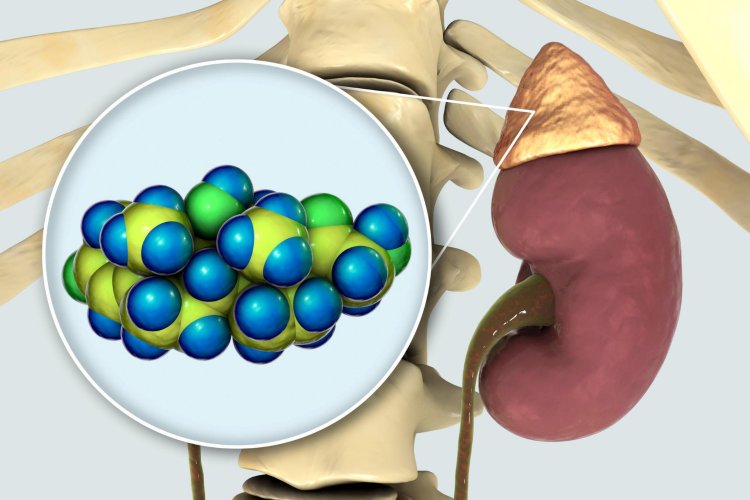Adrenal Glands Hormones, Related Disorders, Diagnosis, and Treatment
The adrenal glands, located atop each kidney, are crucial for maintaining homeostasis through the production of various hormones. These hormones regulate metabolism, blood pressure, immune response, and stress adaptation. When adrenal hormone levels become imbalanced, they can lead to disorders with diverse clinical manifestations, necessitating accurate diagnosis and targeted treatment.

Adrenal Hormones and Their Functions
Cortisol
Cortisol, synthesized in the adrenal cortex, is vital for metabolism, immune regulation, and stress response modulation. Its release follows a diurnal rhythm, peaking in the morning to facilitate wakefulness and declining towards evening to promote sleep. Cortisol levels surge during stressful events, mobilizing energy reserves and suppressing non-essential functions like digestion and reproduction.
Aldosterone
Aldosterone, also produced in the adrenal cortex, governs electrolyte balance and blood pressure regulation. It acts on the kidneys to enhance sodium reabsorption and potassium excretion, thereby expanding blood volume and maintaining vascular tone. Aldosterone secretion is primarily regulated by the renin-angiotensin-aldosterone system in response to changes in blood volume and sodium levels.
Adrenaline and Noradrenaline
Adrenaline and noradrenaline, synthesized in the adrenal medulla, are key mediators of the sympathetic nervous system's fight-or-flight response. Adrenaline increases heart rate, redirects blood flow to vital organs, and enhances glucose availability for energy production. Noradrenaline augments peripheral vasoconstriction, elevates blood pressure, and enhances alertness. Their rapid release during stress primes the body for immediate action.
Adrenal Disorders and Their Symptoms
Cushing's Syndrome
Causes
Prolonged exposure to excessive cortisol levels, either endogenously due to adrenal overproduction or exogenously from corticosteroid medications.
Symptoms
Characterized by central obesity, moon facies, buffalo hump, easy bruising, thin skin, muscle weakness, hypertension, glucose intolerance, and mood disturbances.
Diagnosis and Treatment
Diagnosis involves assessing cortisol levels through dexamethasone suppression tests, midnight salivary cortisol, or 24-hour urinary free cortisol measurements. Treatment aims to normalize cortisol levels through surgical resection of adrenal tumors, radiation therapy, or medication adjustments.
Addison's Disease
Causes
Adrenal insufficiency stemming from autoimmune destruction, infections (e.g., tuberculosis), or adrenal hemorrhage.
Symptoms
Chronic fatigue, anorexia, weight loss, salt craving, hypotension, hyperpigmentation, nausea, vomiting, and abdominal pain.
Diagnosis and Treatment
Diagnosis relies on assessing morning cortisol and plasma adrenocorticotropic hormone (ACTH) levels, along with ACTH stimulation tests. Treatment entails lifelong glucocorticoid and mineralocorticoid replacement therapy to address cortisol and aldosterone deficiencies.
Pheochromocytoma
Causes
Adrenal chromaffin cell tumors resulting in excessive catecholamine secretion, predominantly adrenaline and noradrenaline.
Symptoms
Paroxysmal hypertension, palpitations, headaches, diaphoresis, tremors, anxiety, and weight loss.
Diagnosis and Treatment
Diagnosis involves measuring plasma or urinary metanephrines and catecholamines, coupled with imaging studies like CT or MRI scans for tumor localization. Treatment encompasses surgical resection of the tumor, alpha-adrenergic blockade, and preoperative alpha- and beta-adrenergic blockade to prevent intraoperative hypertensive crises.
In conclusion, the adrenal glands are indispensable for maintaining physiological equilibrium, orchestrating adaptive responses to internal and external stressors. Disorders affecting adrenal hormone production can have profound systemic effects, necessitating comprehensive evaluation and tailored interventions. Timely diagnosis, often involving hormone assays and imaging studies, facilitates prompt initiation of targeted therapies, optimizing patient outcomes and quality of life.
#AdrenalHormones #Cortisol #Aldosterone #Adrenaline #Noradrenaline #AdrenalDisorders #CushingsSyndrome #AddisonsDisease #Pheochromocytoma #Healthcare #Endocrinology #Physiology #MedicalScience
Disclaimer:
The information provided in this article is for educational purposes only and should not be considered medical advice. If you have any health concerns or are experiencing symptoms, it is important to consult with a healthcare professional, such as a doctor or clinic, for proper diagnosis and treatment. Always seek the advice of your doctor or other qualified health provider with any questions you may have regarding a medical condition. Do not disregard professional medical advice or delay in seeking it because of something you have read in this article.
What's Your Reaction?





















